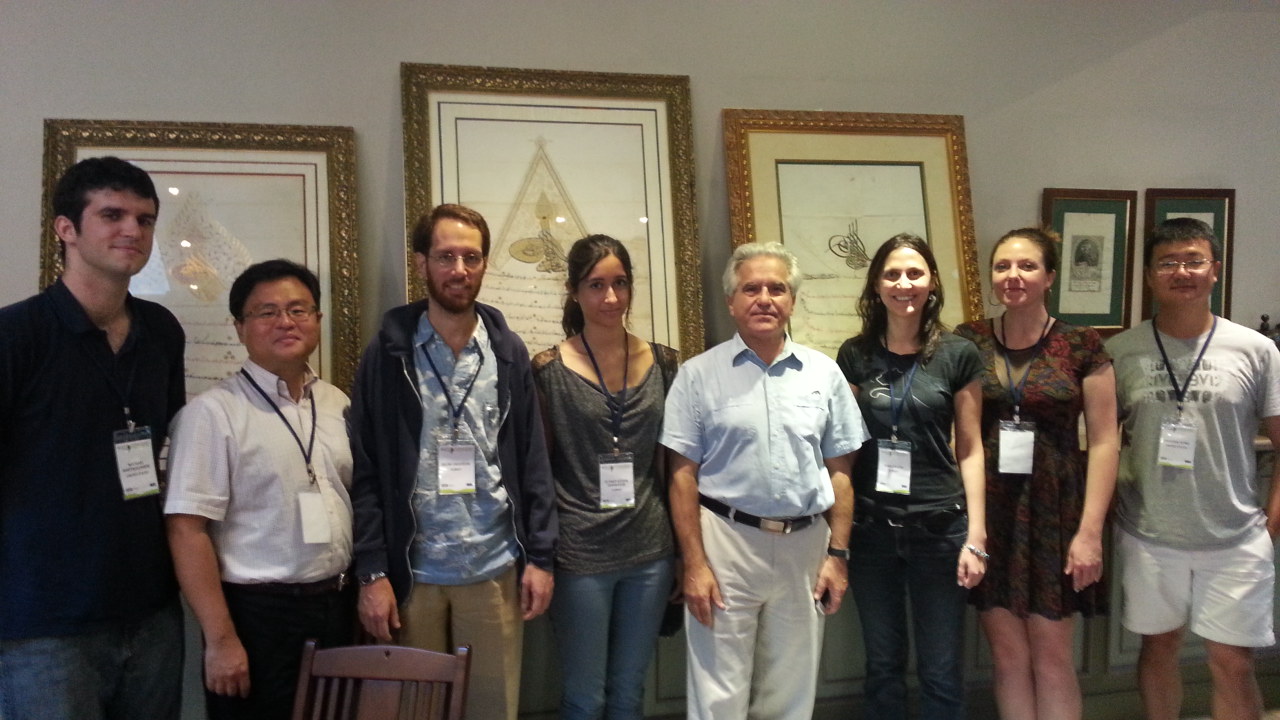Texas Action Group at Austin
Texas Action Group at Austin is a research group within the
Department of Computer Science of the University of Texas at Austin.
It is part of a larger community,
Texas Action Group, which
includes participants from many parts of the world.
Most of our current work deals with the theory of answer set programming
(ASP). We are interested in the semantics of ASP programming constructs and
in the methodology of developing reliable, provably correct ASP programs.
Current and Former Members of Texas Action Group at Austin with
Their Students
at the International Conference on Logic Programming in Istanbul, Turkey
(2013)

Pictured (from left to right): Mike Bartholomew,
Joohyung Lee,
Selim Erdoğan,
Zeynep Gözen Sarıbatur,
Vladimir Lifschitz,
Esra Erdem,
Amelia Harrison,
Fangkai Yang.
What is Answer Set Programming?
Programmers usually solve computational problems by designing algorithms
and encoding them in an implemented programming language. Research in
artificial intelligence and computational logic has led to an
alternative, "declarative" approach to programming, which
does not involve encoding algorithms. A program in a declarative
language only describes what is counted as a solution. Given such a
description, a declarative programming system finds a solution by the
process of automated reasoning.
Answer set programming (ASP) is a form of declarative
programming oriented towards difficult (primarily NP-hard) search problems,
where the goal is to find a solution among a large, but finite, number of
possibilities. Such problems arise in many areas of science and
techology.
ASP is based on the stable model semantics of logic programming.
In ASP, search problems are reduced to computing stable models, and answer
set solvers--programs for generating stable models--are used to perform
search.
History of Answer Set Programming in Austin
1988:
The concept of a
stable model is introduced by Michael Gelfond (then at UT El Paso) and
Vladimir Lifschitz (then at Stanford University). Three years later,
Vladimir moved to Austin.
1993:
Stable models are applied to
the problem of
describing dynamic domains in artificial intelligence.
1994:
Computing stable
models by splitting is introduced.
1999:
Answer set programming is applied to
planning.
2001:
Strong
equivalence of logic programs is defined.
2002:
Esra Erdem defends the dissertation on
Theory and Applications
of Answer Set Programming. This was the first dissertation on
answer set programming anywhere in the world.
2003:
Tight logic
programs are investigated. Answer set programming is applied to
reconstructing
the evolutionary history of Indo-European languages.
The concept of a loop formula is
extended to disjunctive logic programs. Answer set solver
CMODELS
is released.
2004:
Answer set programming is applied to
protocol
insecurity problems. The 1988 paper on stable models receives a
Most Influential Paper in 20 Years award from the Association for
Logic Programming.
2005:
Relationship between
weight constraints and nested expressions is investigated.
The concept of a stable model is
extended to
arbitrary propositional theories and is used to define a new semantics
of aggregates.
2006:
Answer set programming is applied to
natural
language understanding.
2007:
Answer set programming is applied to
the
history of Chinese dialects and to historical zoology. The concept
of a stable model is
extended to
first-order formulas. Paolo Ferraris defends the dissertation on
Expressiveness
of Answer Set Languages.
2008:
A survey of answer
set programming is presented at the AAAI Conference on Artificial
Intelligence.
2009:
Symmetric
splitting is defined.
A new
decidable class of finitely ground programs is found.
2010:
Yuliya Lierler
defends the dissertation on SAT-based
Answer Set Programming.
2012:
Answer set programming is applied to
parsing natural language and to
null values in
deductive databases.
2013:
Answer set programming is applied to
recognizing textual entailment.
2014:
Answer set programming is applied to
mobile robot planning.
2015:
Stable models of infinitary formulas are used
to define the
semantics of the ASP grounder GRINGO.
2016:
Supersafe
rules are investigated.
A new approach to
proving
infinitary formulas is proposed. A new
ASP
programming methodology is introduced.
2017:
Amelia Harrison defends the dissertation on Formal
Methods in Answer Set Programming.
